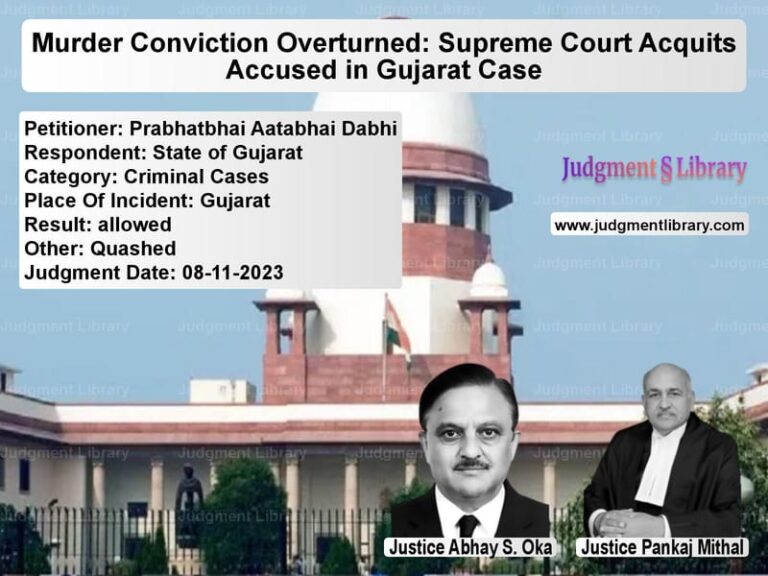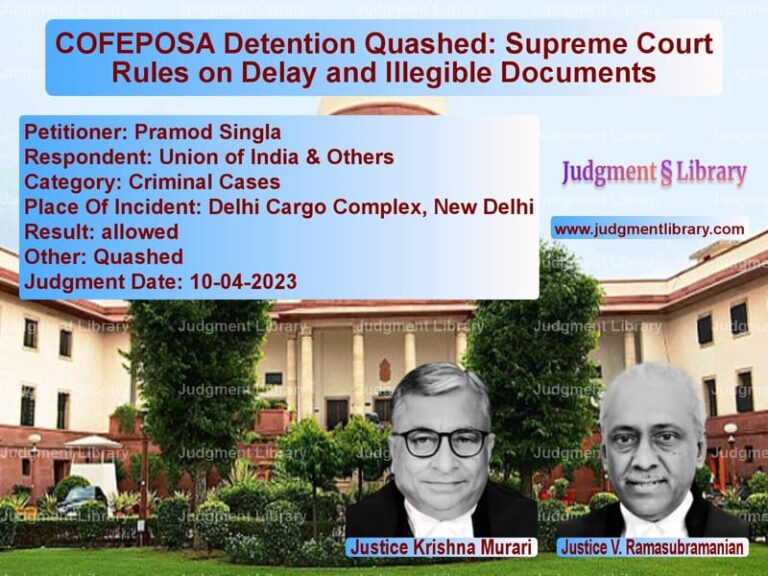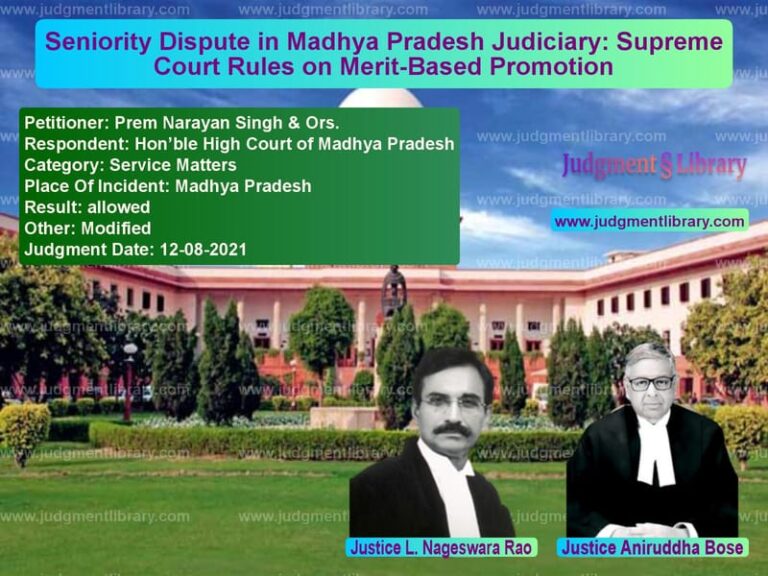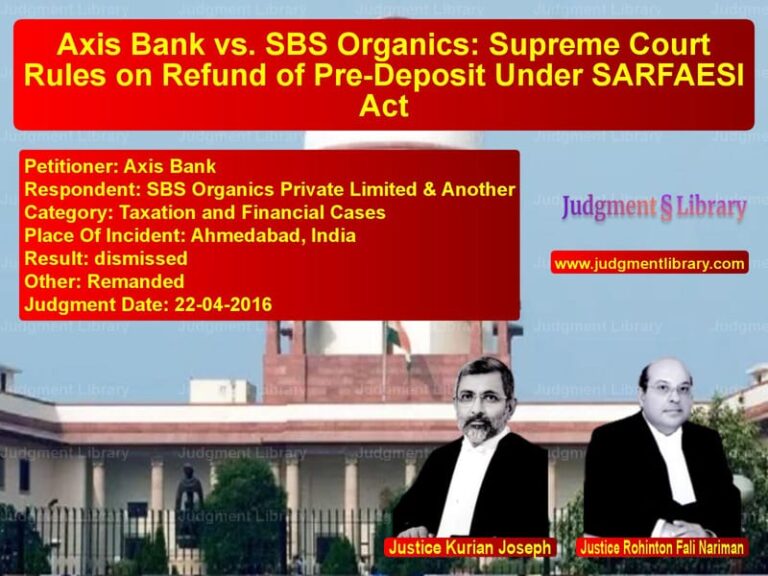Debt Assignment and Secured Creditor Status: Supreme Court Ruling on SARFAESI Act
The Supreme Court of India, in its judgment in Suzuki Parasrampuria Suitings Pvt. Ltd. vs. The Official Liquidator of Mahendra Petrochemicals Ltd., delivered on October 8, 2018, clarified crucial legal principles regarding debt assignment, secured creditor rights, and proceedings under the SARFAESI Act. The ruling addressed whether an assignee of debt could claim the status of a secured creditor and whether inconsistent legal positions in the same case were permissible.
Background of the Case
The case originated from a winding-up petition filed against Mahendra Petrochemicals Ltd. (MPL), leading to its liquidation. The company was referred to the Board for Industrial and Financial Reconstruction (BIFR) under Reference No. 385 of 2000. However, without informing the BIFR or obtaining approval, MPL entered into an unregistered Memorandum of Understanding (MOU) with Suzuki Parasrampuria Suitings Pvt. Ltd. (the appellant) for leasing its properties to repay debts.
The MOU was not disclosed to the Company Court until after the winding-up order was passed on April 19, 2010. Meanwhile, Industrial Finance Corporation of India Ltd. (IFCI) had the first charge over MPL’s assets with outstanding dues of Rs. 160 crores. Bank of Baroda and Punjab National Bank were also secured creditors, with Bank of Baroda holding a second charge for Rs. 4.68 crores.
Following the winding-up order, IFCI assigned its dues to Suzuki Parasrampuria Suitings Pvt. Ltd. (the appellant) for a sum of Rs. 85 lakhs and informed the Official Liquidator.
Arguments by the Petitioner (Suzuki Parasrampuria Suitings Pvt. Ltd.)
- The appellant sought substitution as a secured creditor in place of IFCI under the SARFAESI Act.
- They contended that the debt assignment agreement with IFCI entitled them to all rights of the original secured creditor.
- The Company Court erred in rejecting their application for substitution.
Arguments by the Respondent (Official Liquidator & Banks)
- The Official Liquidator argued that the appellant was not a bank, financial institution, securitization company, or reconstruction company as defined under the SARFAESI Act.
- Since the appellant did not meet the statutory criteria, it could not claim the status of a secured creditor.
- The appellant had initially sought substitution under the SARFAESI Act but later changed its stance to claim rights under Section 130 of the Transfer of Property Act.
Company Court’s Decision
The Company Court, in its order dated July 31, 2015, rejected the appellant’s application for substitution, holding that:
- The appellant did not qualify as a secured creditor under the SARFAESI Act.
- Section 130 of the Transfer of Property Act was not applicable in the context of SARFAESI proceedings.
- The appellant could pursue its claim through other legal avenues but could not seek substitution in the liquidation proceedings.
High Court’s Ruling
The appellant filed a review petition, arguing that they had never sought secured creditor status under the SARFAESI Act but had merely requested substitution under the Transfer of Property Act. However, the High Court rejected this argument, citing contradictions in the appellant’s earlier claims.
Supreme Court’s Analysis and Judgment
The Supreme Court reviewed whether the appellant’s claims were consistent and whether the lower courts had correctly interpreted the SARFAESI Act and the Transfer of Property Act.
Key Observations of the Court
- The Supreme Court noted that the appellant had initially sought substitution under the SARFAESI Act but later changed its argument to claim rights under the Transfer of Property Act.
- It reiterated that a litigant cannot take contradictory stands in the same proceedings.
- The appellant’s debt assignment agreement with IFCI did not automatically confer secured creditor status.
- The lower courts had rightly rejected the appellant’s plea for substitution.
Final Ruling
- The Supreme Court dismissed the appeal.
- It upheld the Company Court and High Court rulings that the appellant could not be substituted as a secured creditor under the SARFAESI Act.
- The Court emphasized that parties must maintain consistency in legal arguments and cannot approbate and reprobate in the same case.
Impact of the Judgment
This ruling has significant implications for financial institutions, debt assignments, and liquidation proceedings:
- It reinforces that secured creditor rights under the SARFAESI Act are strictly limited to banks, financial institutions, and recognized securitization companies.
- It clarifies that debt assignees must establish their legal standing independently and cannot automatically claim the rights of the original creditor.
- It upholds the principle that litigants must maintain consistency in their legal positions.
Conclusion
The Supreme Court’s judgment in Suzuki Parasrampuria Suitings Pvt. Ltd. vs. The Official Liquidator of Mahendra Petrochemicals Ltd. reinforces that debt assignees cannot claim secured creditor status unless they meet the statutory requirements of the SARFAESI Act. The ruling ensures legal consistency in liquidation proceedings and prevents undue claims by assignees who do not meet the regulatory framework.
Petitioner Name: Suzuki Parasrampuria Suitings Pvt. Ltd..Respondent Name: The Official Liquidator of Mahendra Petrochemicals Ltd..Judgment By: Justice Ranjan Gogoi, Justice Navin Sinha, Justice K.M. Joseph.Place Of Incident: India.Judgment Date: 08-10-2018.
Don’t miss out on the full details! Download the complete judgment in PDF format below and gain valuable insights instantly!
Download Judgment: Suzuki Parasrampuria vs The Official Liquida Supreme Court of India Judgment Dated 08-10-2018.pdf
Direct Downlaod Judgment: Direct downlaod this Judgment
See all petitions in Bankruptcy and Insolvency
See all petitions in Corporate Compliance
See all petitions in unfair trade practices
See all petitions in Judgment by Ranjan Gogoi
See all petitions in Judgment by Navin Sinha
See all petitions in Judgment by K.M. Joseph
See all petitions in dismissed
See all petitions in supreme court of India judgments October 2018
See all petitions in 2018 judgments
See all posts in Corporate and Commercial Cases Category
See all allowed petitions in Corporate and Commercial Cases Category
See all Dismissed petitions in Corporate and Commercial Cases Category
See all partially allowed petitions in Corporate and Commercial Cases Category







